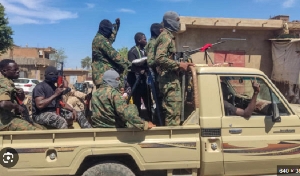- Home - News
- TWI News | TV
- Polls
- Year In Review
- News Archive
- Crime & Punishment
- Politics
- Regional
- Editorial
- Health
- Ghanaians Abroad
- Tabloid
- Africa
- Religion
- Election 2020
- Coronavirus
- News Videos | TV
- Photo Archives
- News Headlines
- Press Release
Opinions of Saturday, 31 December 2005
Columnist: Quansah, Kwasi Obiri
Global Terrorism: How Is Ghana Seen In The Picture?
The arrest in London
For the second time this year a Ghanaian has been mentioned in terrorism related case. In July this year a number of suspects were apprehended in the United Kingdom for their alleged role in a failed terrorist attack. This was in the immediate aftermath of the July 7th London Bombings that claimed 52 precious lives. Ironically a Ghanaian was among those who died in the July 7th Bombings. Then came the shocking news that sent electric waves in the blood of every native born Ghanaian; that a Ghanaian was among those arrested. He was charged and remanded with his suspected accomplices.
The arrest in Spain
What do these people have in common; a Moroccan, an Iraqi, a Saudi Arabian, an Egyptian, a Belarusian, French, a Spaniard and a Ghanaian? Well if you think they have nothing in common then read on. On Monday December 19, Spanish police arrested 15 people suspected of recruiting fighters for Iraqi terrorist groups. The suspects were accused of belonging to a group that recruits, train and send fighters for Iraq to fuel the insurgency. According to a statement from the Interior Ministry in Spain, eight of the 15 are Moroccans, and the seven others included an Iraqi, a Saudi Arabian, an Egyptian, French, a Spaniard and the big surprise, a Ghanaian.
The Issue of Terrorism
I do not intend to go into the nitty-gritty of the debate about the justification or otherwise of terrorism (including its brain-child suicide bombing). My simple judgment (call it subjective) is that terrorism is wrong. It is not something to be proud of or support under any circumstances. No civilized society can tolerate the killing of innocent people as well as the spread of uncertainty and insecurity. Terrorism violates the principle of discrimination, which declares the immunity of non-combatants from direct attack. Unlike conventional warfare, which is primarily directed against combatants or military targets, terrorist?s main targets are the civilian population. They employ violence indiscriminately. They do not discriminate between the guilty and the innocent. They assume that the massacre or slaughter of innocent civilians would sow panic, give them publicity and help unstable society. Going by the ethics of consequentialism, which judges human action solely in terms of its consequences, terrorism should be judge in terms of its intended consequences; causing pain, sufferings, death and destruction.
The Ghanaian factor
A lot of questions remained unanswered, and it is here that the government of Ghana and especially its missions in the countries involved are expected to act quickly.
The first question is; are these people actually Ghanaians? Or is it just mistaken identities? Some of us find it very difficult to swallow the thought that a full blooded Ghanaian would for any reason be a party to an act aimed at destroying human lives. It is very much at odds with the Ghanaian culture of compassion, the desire to show kindness and hospitality. Ghana like any other country has it own social, economic and political problems. We even have isolated cases of violence in the form of inter and intra ethnic conflicts. A typical one being the conflict between the Konkombas one the one hand, and the triple alliance of Dagombas, Nanumbas and Gonjas. But to think that a Ghanaian could be involved in an act of global terrorism is unimaginable. That is why the question whether or not they are Ghanaians is very important. Could it be that as a result of the lack of strict control in passport acquisition in Ghana and its missions abroad rogue elements from other countries are taking advantage to perpetrate their evil agenda? Or could it also be that they are genuine Ghanaians who find themselves at the wrong place at the wrong time? This is also a possibility because issues of immigration could drive people into the lion?s den.
The second issue is assuming they are genuine Ghanaians and are truly involved (I am playing the devil?s advocate here) then the next question is how are they recruited? What are the soft spots? What are the motivations? Could it be religious fanaticism, political or the lust for money? These are questions that cannot be ignored.
Implications
For sometime now, the international community has alleged that Ghana is a transit point for drug traffickers. This has already put the country?s name in the black books. The arrest of the MP Eric Amoateng, if found guilty will add more credence to this accusation. This is already too heavy for the country to bear. It is not something to be proud of especially when the news being peddled in the U.S media is that Eric Amoateng is a very prominent government official. There is also the unproven allegation in certain quarters that Amoateng?s arrest has been linked to terrorism on the grounds that the money gotten from the sale of drugs is used to fund terrorist activities.
To be seen as a breeding ground for terrorist would damage any remaining reputation that the country has. It will put the country under the watchful lenses of the intelligent agencies in America and the rest of the West. This could make life unbearable for Ghanaians abroad and difficult for potential travelers.
Also if some Ghanaians are actually getting involved in this beastly and reprehensible act for whatever reason, then there could be a spillover in the future. These people are trained to be trainers. They are brainwashed and indoctrinated in a certain way. Violence is a characteristic of them. The danger is that once they have finished with whatever they have been trained to do they will come back home. They will eventually dilute our peaceful culture with their violent nature.
This is why the official silence from the government of Ghana on such an important issue is rather strange. When authorities in London named the suspect they arrested as Manfo Kwaku Asiedu, Ghana?s deputy IGP Dr Manfo came out to say that he has a son in London who bears the same name. He went on to say that it could be a mistaken identity because his son is not mentally well. But I think just coming out to say this is nothing but rubbish. After all Dr Manfo said he has travelled to London several times prior to the incidence to get his son back to Ghana but to no avail. So then the best thing to do was to have travelled this time to London to clarify the issue of his son?s identity or mental state to the authorities in London. Somebody who is mentally ill in the UK will definitely have medical records to prove it. That is if the suspect is his son. If it turns out that it is a mistaken identity as he claimed then the air would have been cleared and the police in London would have also known how to conduct their investigation. But it turned out that the deputy IGP thought it was okay to sit at home and make statements. I hope he knew how hard it was for Ghanaians living in London to disclose their nationalities sometimes. There is an unsubstantiated news that the man arrested in London is not the suppose son of Dr Manfo, the deputy IGP. That doesn?t solve the problem anyway, because when the allege suspect was sent to court, the charges and proceedings were interpreted to him in a Ghanaian language. So whether it was Jonah who swallowed the Whale or the Whale swallowed Jonah, there was a swallow in the Bible anyway. That is to say whether or not the suspect is Dr Manfo?s son is not material here, but whether or not he is a Ghanaian. The truth here is that even if the deputy IGP is in no way related to the person involved, the whole government machinery and the security apparatus, of which he is a member, has a responsibility to liaise with their counter parts in London and now Spain to ascertain the truth. This will settle the minds and anxiety of Ghanaians.
What we should do
In the immediate time the government should use all its apparatus in these countries to ascertain the real identity and nationalities of those involved. They should establish rapport with their counterparts in these countries to establish the fact. The foreign minister should act quickly to save Ghanaians abroad and those intending to travel.
In the long-term however, the government should initiate moves to register all its citizens abroad. The Ghana missions abroad should be given the needed resources to start the registration of all Ghanaian citizens abroad irrespective of their immigration status. It is unfortunate that the country cannot make an estimate of Ghanaians in countries where we have embassies and High Commissions. Why are we wasting money on these missions then? It is sad that in this age of technology Ghana does not have a database of its citizens in any country. Though we might not be able to do it with mathematical exactitude, we could have a close approximation. I must however say that proper mechanisms should be put in place to ensure that unscrupulous government officials both home and abroad do not take advantage of any such exercise to fill their pockets. This will make the intention behind the exercise a fiasco.
The government should also ensure that people who acquire Ghanaian passports are genuine Ghanaians and that they are taking it for themselves and that they actually need it.
Government bodies, social institutions, NGOs and Religious groups in Ghana also have a big role to play in the fight against religious fundamentalism of any form. This is because the underlying cause of terrorism is religious fundamentalism. This stems from the erroneous belief that success in a suicide or terrorist mission would grant the perpetrator a place in paradise. If there is a God who will grant you a place in his bosom only after slaughtering innocent civilians then that God does not deserve anybody?s respect or worship. Thus, the Mosques, Churches, radio stations should make room for programmes to propagate an alternative to religious fanaticism. How can a loving God grant asylum to callous groups or individuals who indiscriminately slaughter innocent people? Interestingly the radicals who preach this message are living in the comfort of their homes with their wives and children and they push vulnerable young men and women to go and kill themselves. If suicide bombing would grant one such a good place in heaven then why don?t they want to go that same path, but instead send the young? Why do they run to hide when they are being sought after? Don?t they know that the greatness of a man is determined by the price he is ready to pay for the cause he lives for? Why do they run when they are being chased? Don?t they want to die for a cause they so cherish? Or their God has age limitation for suicide bombing? Why is it that it is only the young ones who have their future ahead of them who are persuaded to kill themselves while the aged who preach this poisonous doctrine hide in their bunkers or enjoy with their families. How many radical preachers send their own children on suicide missions? These are legitimate moral and ethical questions to throw to the youth who allow themselves to be manipulated by these wolves in human skin.
As a country we should also ask ourselves; are there any social issues that can throw people into the hands of these people? Are there any groups of people who are deprived socially and economically? Are the national resources being distributed equally among the various groups and regions? Deprivation we shouldn?t forget can drive people to the wall.
Mr. foreign Minister, it is for some of these reasons that you represent our interest abroad, so act now or stand down. We have had enough of these nonchalance and inactivity.











